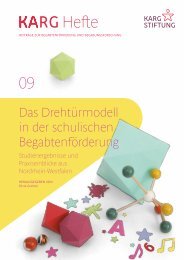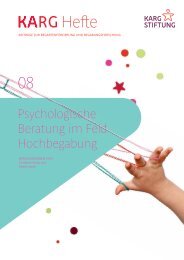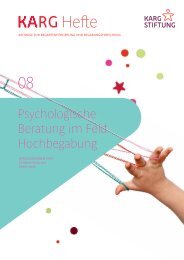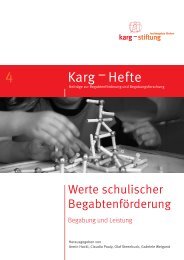FAQS: Frequently asked questions about giftedness
The Karg Foundation receives a lot of questions on the subject of giftedness—FAQs (Frequently Asked Questions)—far more often indeed than it did ten years ago. And this is a good thing! Many people involved in the educational processes of children have come to realize that giftedness can also be a fundamental personality trait of children and adolescents. The Karg Foundation wants to answer the questions you may have not only as educational and psychological professionals in educational institutions or working as educational providers, policy makers, or in training and further education institutes, but as parents and gifted people also: What is giftedness? How can it be identified? Who can provide advise for gifted children and their families? How can they be supported in the best possible way?
The Karg Foundation receives a lot of questions on the subject of giftedness—FAQs (Frequently Asked Questions)—far more often indeed than it did ten years ago. And this is a good thing! Many people involved in the educational processes of children have come to realize that giftedness can also be a fundamental personality trait of children and adolescents.
The Karg Foundation wants to answer the questions you may have not only as educational and psychological professionals in educational institutions or working as educational providers, policy makers, or in training and further education institutes, but as parents and gifted people also: What is giftedness? How can it be identified? Who can provide advise for gifted children and their families? How can they be supported in the best possible way?
You also want an ePaper? Increase the reach of your titles
YUMPU automatically turns print PDFs into web optimized ePapers that Google loves.
When is intelligence testing<br />
appropriate?<br />
Diagnostic testing is indicated when a specific question<br />
requires an answer in a particular situation and the<br />
test results can provide this information. For <strong>questions</strong><br />
involving a child’s intelligence, intelligence tests are the<br />
tool of choice. These tests provide more accurate and reliable<br />
results than other methods of assessing intelligence,<br />
they can provide information on aptitude strengths, and<br />
they can predict relatively accurately how further achievement<br />
will develop. Typical reasons for intelligence testing<br />
include <strong>questions</strong> relating to a child’s suitability for early<br />
enrollment in school or for skipping a grade. Does the<br />
child’s intellectual ability meet the criteria for successful<br />
participation in the higher grade? In many cases, various<br />
indicators will already be available by the time the question<br />
of providing specific support measures arises, for<br />
example, when a five-year-old child is already able to read<br />
or a school-age child is performing extremely well academically.<br />
Objective intelligence assessment by means of a<br />
standardized test is frequently recommended. At other<br />
times, the situation is less obvious, for example, when a<br />
child makes a very talented impression but still performs<br />
poorly in school. Thorough diagnostic testing is particularly<br />
valuable in such cases to provide the child with appropriate<br />
support. Intelligence testing in adolescence can be<br />
used to identify the areas where a student possesses<br />
specific strengths or—by comparison—specific weaknesses.<br />
Being aware of one’s intelligence profile can be<br />
helpful to adolescent gifted students when making academic<br />
career decisions as well as choosing their courses<br />
of study. Also, several support organizations may require<br />
the results of intelligence testing before deciding whether<br />
or not to accept or admit children or adolescents into their<br />
programs. Finally, the results of intelligence testing can<br />
also help extremely insecure gifted students gain clarity<br />
<strong>about</strong> their cognitive abilities. Thus, results of intelligence<br />
tests can provide very valuable information; however, even<br />
they should not be used as the sole basis for decision<br />
making, for example, on the school career trajectory, but<br />
should always be interpreted alongside other information,<br />
such as a person’s development to date.<br />
34 35
















